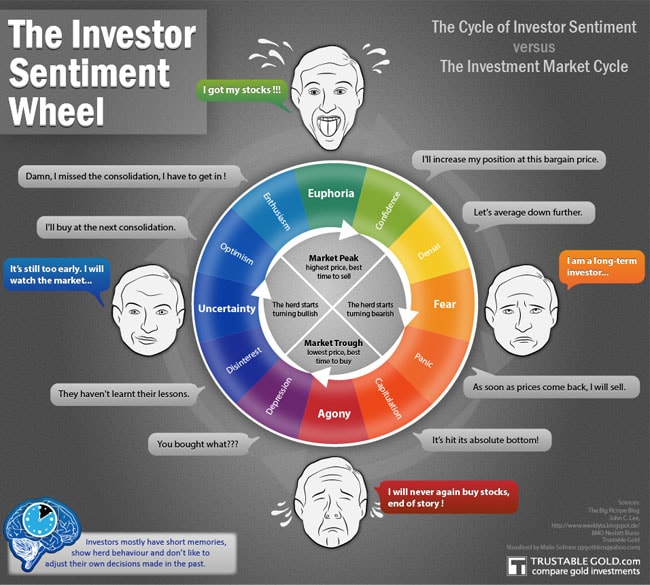A stock chart is nothing more than human emotions that are graphed. Master your emotions first then you will master your trading.
Here comes a time when the development of your trading system, testing, filtering the signals, add ons, comparison with best trading systems is over. Your brand new system is ready to enter the real market. There is only one little thing left – starting the trading.
You open an account, deposit that and start the trade. You get the first signal. The trading system confirms. After making a deal you put stop-loss. The stop-loss is activated, which leads to the first loss. It’s not a big shame, even successful traders incur losses – it’s one of the pitfalls of the job. Continue the trading.
Second deal and stop-loss work again. This time the loss affects you – the price had knocked you out of the market. As a joke, the price went straight through your value. You could had made good money on the deal, but the market ruined your plans. You’re clueless, you try to test your trading system – everything fine. You keep trading: you think that the main guarantee of success lay in the strategy you follow.
After making more deals, you start the analysis. Yes, it’s mainly loss, but there were few positive deals with great potential. The only thing you need to do is increasing the number of positive deals. Everything seems simple and clear.
Getting back to trading, keeping in mind new conclusions, you make a new deal. The desire to be back on track pushes you forward and you increase the trading lot. Suddenly, the news arrives and whole market is against you. You have a feeling, the market behavior is indefinable, no logic. You start to loose the trust in your trading system. The sequence of loss confirms your friars. What’s going on?
Actually, nothing wrong with either market nor trading system. The explanation: you start to loose control. Every upcoming deal is less and less analyzed, which leads to losses train.
What kinds of biases explain such blatantly irrational behavior?
- Loss Aversion. Irrational preference for avoiding a loss rather than seeing a gain. “I’d rather avoid a $5 fee than get a 5% discount.”
- Mental Accounting. Putting fungible assets into arbitrary mental categories, such as “money I need” vs. „money I can afford to lose.”
- Overconfidence. Having higher confidence than you should, such as thinking you time the market correctly 90% of time, when you are actually wrong 50% of the time.
- Anchoring. Heavily emphasizing one or two attributes while ignoring all others. “This company’s P/E ratio is solid, and that’s all that matters.”
- Sunk Cost Fallacy. Allowing past expenditures to influence future decisions. „But I’ve poured so much money into this stock, I can’t dump it now!”
No doubt, every trader is familiar with this plot, many of them had actually played in. Not every trader under pressure of emotions can admit it. Self-control is the only thing makes you a successful dealer. Look at the investor sentiment wheel below:

However, sometimes, it’s the trading system, which is the reason of problems. Especially, if you borrowed it, why would anyone lend a super-profit system to somebody? There is a common saying – money loves silence. If you are lucky enough to get someone’s profitable system, fix it with less emotions.
The easiest way to get over psychology is to start with little money or 1 stock. The result you can see in my project Intomillion. I must admit, I do not like demo-accounts and trading by them, but you can use it for educational purposes – to see how trading terminal works. Start with real account of 100 USD, don’t be afraid to loose. It is experience you’re buying. Only after having a positive result start increasing the investments. Of course, this approach don’t guarantee the fast profit, but it helps your to get rid of emotions pressure.
Sometimes, it could take ages to minimise your emotions affects. Thus, if your aim is to make money in fast way, you better look before your leap. Beside that, loosing money is the only thing happens fast on stock market. If you are a beginner at market, you should have a lot of patience and start with little. Think Big start small. Better safe then sorry, save the money on your account – you might need it. Remember, every single dollar you spend could happen to be a 1 000 000 dollar tree seed.






